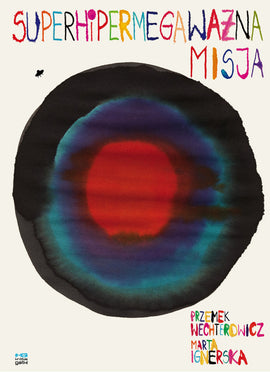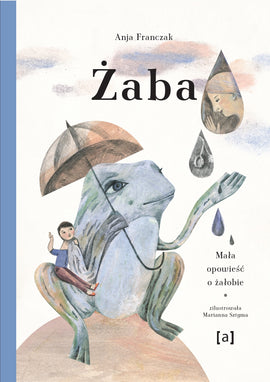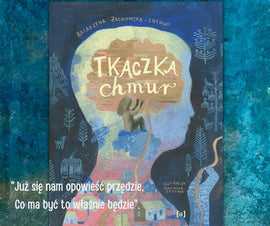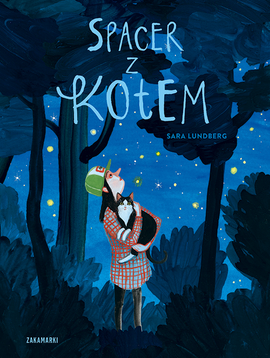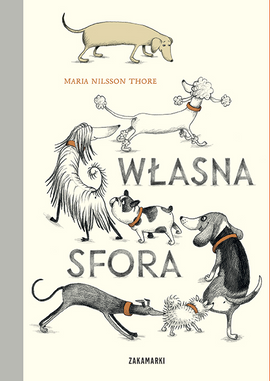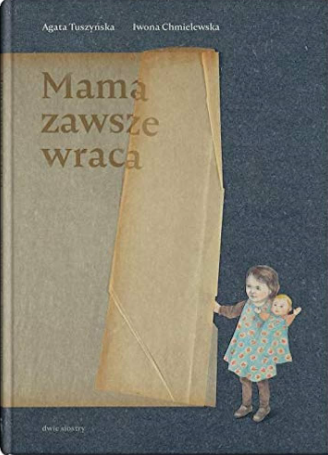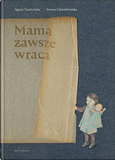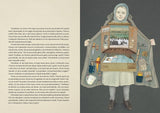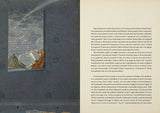Mama zawsze wraca / Kinderbuch Polnisch / A. TUSZYŃSKA / Iwona Chmielewska
Für Kinder ab 8 Jahren:
Nikt nie wie, że tu mieszka dziewczynka. Będziesz tu mieszkała jak krasnoludek. Tak mi powiedziała. [...] Nie czułam się smutna. Nie było mi źle. Nie wiedziałam w ogóle, że jest inne życie. Myślałam, że tak to jest. Nigdy nie chciałam wyjść, bo nie wiedziałam, że można wyjść. Zosia, córka Natalii i Szymona Zajczyków, była malutkim dzieckiem, gdy wybuchła wojna. Jesienią 1940 roku wraz z rodziną trafiła do warszawskiego getta. By ocalić córkę, Natalia ukryła ją w piwnicy. Dziewczynka spędziła tam długie miesiące tylko z ukochaną lalką, w świecie wyobraźni stworzonym dla niej przez matkę. Nie pamięta muru, głodnych ludzi na ulicach, opasek z gwiazdą Dawida. Pamięta kasztany i listki, które przynosiła jej mama, sanki rysowane węglem na podłodze i odwiedzające ją szczury, których na początku wcale się nie bała. Zosia Zajczyk ocalała, jako jedna z niewielu. Po latach opowiada swoją historię. Mama zawsze wraca to spisana przez pisarkę i reportażystkę Agatę Tuszyńską opowieść o niezwykłej więzi matki i córki wśród okrucieństwa wojny. Dodatkowy wymiar nadają jej subtelne, poetyckie ilustracje cenionej w Polsce i na świecie artystki Iwony Chmielewskiej. Nałożona na okładkę papierowa opaska z ważnym w opowieści haftowanym motywem to próba odwrócenia symboliki opaski z gwiazdą Dawida. Tutaj ten kawałek płótna staje się znakiem czułości, ochronnym gestem otaczającym ukryty w książce kruchy świat Natalii i Zosi. Zosię poznałam dawno. Podczas pierwszego, a może drugiego przyjazdu do Izraela. […] Połączenie języka i wrażliwości dziecka z okrucieństwem ówczesnej codzienności sprawiło, że wtedy, dwadzieścia lat temu, przerosła mnie ta opowieść. […] Zamknęłam ją na długo na dnie pamięci. Otworzyłam po latach, silniejsza. […] Uświadomiłam sobie wtedy, jak bliskie są nasze losy. […] Przeglądam się w lustrze tej historii. Historii miłości i nadziei. Historii, która pozwala wierzyć w moc słowa. Agata Tuszyńska
-----------------------------------------------
"Nobody knows that a girl lives here. You'll live here like a leprechaun. She told me so. [...] I didn't feel sad. I wasn't bad. I didn't even know there was another life. I thought that's how it is. I never wanted to go out because I didn't know you could go out. Zosia, the daughter of Natalia and Szymon Zajczyk, was a tiny child when the war broke out. In the fall of 1940, she and her family ended up in the Warsaw Ghetto. To save her daughter, Natalia hid her in the basement. The girl spent long months there alone with her beloved doll, in a world of imagination created for her by her mother. He doesn't remember the wall, the hungry people in the streets, the armbands with the Star of David. She remembers the chestnuts and leaves her mother used to bring her, the charcoal-drawn sleds on the floor, and the rats that visited her, which at first she wasn't afraid of at all. Zosia Zajczyk survived as one of the few. Years later, he tells his story. Mama always comes back is a story written by the writer and reporter Agata Tuszyńska about the extraordinary bond between mother and daughter amidst the cruelty of war. An additional dimension is given by the subtle, poetic illustrations of Iwona Chmielewska, an artist valued in Poland and around the world. The paper band with an embroidered motif, which is important in the story, is an attempt to reverse the symbolism of the band with the Star of David. Here, this piece of canvas becomes a sign of tenderness, a protective gesture surrounding the fragile world of Natalia and Zosia hidden in the book. I met Zosia a long time ago. During my first or maybe second visit to Israel. […] The combination of the language and sensitivity of a child with the cruelty of everyday life at that time made me, twenty years ago, overwhelmed by this story. […] I locked it for a long time at the bottom of my memory. I opened it years later, stronger. […] I realized then how close our fates are. […] I look at myself in the mirror of this story. A story of love and hope. A story that allows you to believe in the power of words. Agata Tuszynska"
© Polska Ksiazka Ilustrowana
| Titel | Mama zawsze wraca / Kinderbuch Polnisch / A. TUSZYŃSKA / Iwona Chmielewska |
| Kurator | mundo azul |
| Typ | Kinderbuch Polnisch |
| Online seit | Jun 30, 2023 |
Für Kinder ab 8 Jahren:
Nikt nie wie, że tu mieszka dziewczynka. Będziesz tu mieszkała jak krasnoludek. Tak mi powiedziała. [...] Nie czułam się smutna. Nie było mi źle. Nie wiedziałam w ogóle, że jest inne życie. Myślałam, że tak to jest. Nigdy nie chciałam wyjść, bo nie wiedziałam, że można wyjść. Zosia, córka Natalii i Szymona Zajczyków, była malutkim dzieckiem, gdy wybuchła wojna. Jesienią 1940 roku wraz z rodziną trafiła do warszawskiego getta. By ocalić córkę, Natalia ukryła ją w piwnicy. Dziewczynka spędziła tam długie miesiące tylko z ukochaną lalką, w świecie wyobraźni stworzonym dla niej przez matkę. Nie pamięta muru, głodnych ludzi na ulicach, opasek z gwiazdą Dawida. Pamięta kasztany i listki, które przynosiła jej mama, sanki rysowane węglem na podłodze i odwiedzające ją szczury, których na początku wcale się nie bała. Zosia Zajczyk ocalała, jako jedna z niewielu. Po latach opowiada swoją historię. Mama zawsze wraca to spisana przez pisarkę i reportażystkę Agatę Tuszyńską opowieść o niezwykłej więzi matki i córki wśród okrucieństwa wojny. Dodatkowy wymiar nadają jej subtelne, poetyckie ilustracje cenionej w Polsce i na świecie artystki Iwony Chmielewskiej. Nałożona na okładkę papierowa opaska z ważnym w opowieści haftowanym motywem to próba odwrócenia symboliki opaski z gwiazdą Dawida. Tutaj ten kawałek płótna staje się znakiem czułości, ochronnym gestem otaczającym ukryty w książce kruchy świat Natalii i Zosi. Zosię poznałam dawno. Podczas pierwszego, a może drugiego przyjazdu do Izraela. […] Połączenie języka i wrażliwości dziecka z okrucieństwem ówczesnej codzienności sprawiło, że wtedy, dwadzieścia lat temu, przerosła mnie ta opowieść. […] Zamknęłam ją na długo na dnie pamięci. Otworzyłam po latach, silniejsza. […] Uświadomiłam sobie wtedy, jak bliskie są nasze losy. […] Przeglądam się w lustrze tej historii. Historii miłości i nadziei. Historii, która pozwala wierzyć w moc słowa. Agata Tuszyńska
-----------------------------------------------
"Nobody knows that a girl lives here. You'll live here like a leprechaun. She told me so. [...] I didn't feel sad. I wasn't bad. I didn't even know there was another life. I thought that's how it is. I never wanted to go out because I didn't know you could go out. Zosia, the daughter of Natalia and Szymon Zajczyk, was a tiny child when the war broke out. In the fall of 1940, she and her family ended up in the Warsaw Ghetto. To save her daughter, Natalia hid her in the basement. The girl spent long months there alone with her beloved doll, in a world of imagination created for her by her mother. He doesn't remember the wall, the hungry people in the streets, the armbands with the Star of David. She remembers the chestnuts and leaves her mother used to bring her, the charcoal-drawn sleds on the floor, and the rats that visited her, which at first she wasn't afraid of at all. Zosia Zajczyk survived as one of the few. Years later, he tells his story. Mama always comes back is a story written by the writer and reporter Agata Tuszyńska about the extraordinary bond between mother and daughter amidst the cruelty of war. An additional dimension is given by the subtle, poetic illustrations of Iwona Chmielewska, an artist valued in Poland and around the world. The paper band with an embroidered motif, which is important in the story, is an attempt to reverse the symbolism of the band with the Star of David. Here, this piece of canvas becomes a sign of tenderness, a protective gesture surrounding the fragile world of Natalia and Zosia hidden in the book. I met Zosia a long time ago. During my first or maybe second visit to Israel. […] The combination of the language and sensitivity of a child with the cruelty of everyday life at that time made me, twenty years ago, overwhelmed by this story. […] I locked it for a long time at the bottom of my memory. I opened it years later, stronger. […] I realized then how close our fates are. […] I look at myself in the mirror of this story. A story of love and hope. A story that allows you to believe in the power of words. Agata Tuszynska"
© Polska Ksiazka Ilustrowana

